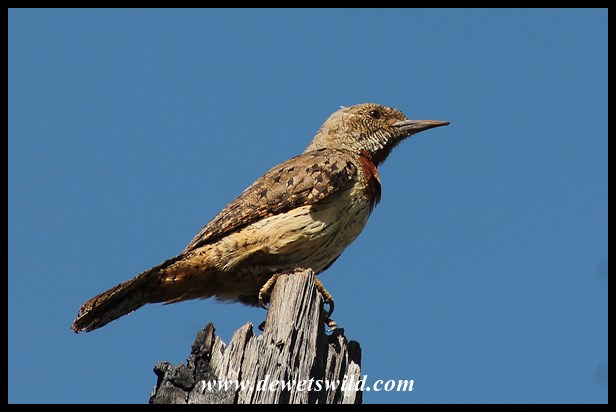Jynx ruficollis
A member of the woodpecker family, the Red-throated Wryneck is a specialist species tied closely to moist grasslands with a meagre scattering of trees. They feed mainly on the ground, dining exclusively on ants and termites, licking them up with an exceptionally long and sticky tongue.
Red-throated Wrynecks are usually encountered singly or in pairs. The breed in cavities in trees (either natural or crafted by barbets and woodpeckers) through the spring and summer seasons. Both parents take turns to incubate the clutch of 1-6 eggs over a two week period, with the chicks remaining in the nest for about a month after hatching and then becoming independent soon after fledging.
The Red-throated Wryneck has a very patchy distribution over sub-Saharan Africa. The IUCN considers the species to be of least concern, siting a growing population, especially in South Africa where exotic trees planted in the grassland biomes have created opportunity for expansion of both its range and numbers. In our country they are found over most of the Eastern Cape, Free State, Gauteng, Mpumalanga and Kwazulu-Natal, extending marginally into the Limpopo Province.













Such an interesting bird – your header shot is great.
LikeLiked by 1 person
Thank you, Carol!
LikeLiked by 1 person
So well camouflaged for its environment.
LikeLiked by 1 person
Blends in expertly against bark and dead wood!
LikeLiked by 1 person
I applaud the beautiful header shot and other clear photographs of this bird that leads me a merry dance by hiding in the treetops in my garden! I hear you, but I cannot see you! Oh, there your are – now who planted so many trees that get in the way? That sort of dance 🙂
LikeLike
Thank you very much, Anne. That’s been my experience for the most part as well – these birds are great at keeping tree trunks between themselves and a nosy photographer – and again I am very envious of you and your garden playing host to such a special bird.
LikeLiked by 1 person
Anything that eats termites is all right in my book and doesn’t even have to look as handsome as these guys do!
janet
LikeLiked by 1 person
😀
I can see the termite PR-department scurrying to get a positive termite post into your facebook feed right about now, Janet!
LikeLiked by 1 person
We have a bird that resembles the Wryneck is called Flicker. Very interesting concept. Thanks, D. 🙂
LikeLiked by 1 person
The Woodpeckers seem to be a very extensive family!
LikeLiked by 1 person
Lovely series of photos, I don’t think we get woodpeckers in Tasmania 😦
LikeLiked by 1 person
Thanks a lot, TasView. I suppose Tasmania’s been cut off from the rest of the world longer than the woodpeckers’ evolutionary line goes back?
LikeLiked by 1 person
I expect so, I just did a search out of curiosity and apparently only Antarctica, Madagascar, Australia, New Zealand and New Guinea don’t have woodpeckers. Mind you, we don’t have unicorns either 😉
LikeLike
That’s very interesting indeed, considering that all the landmasses you mention have quite “unusual” fauna and flora, owing to the length of time they have been isolated from most of the rest of the world. I think all of us were isolated from the unicorn island earlier still! 😀
LikeLiked by 1 person